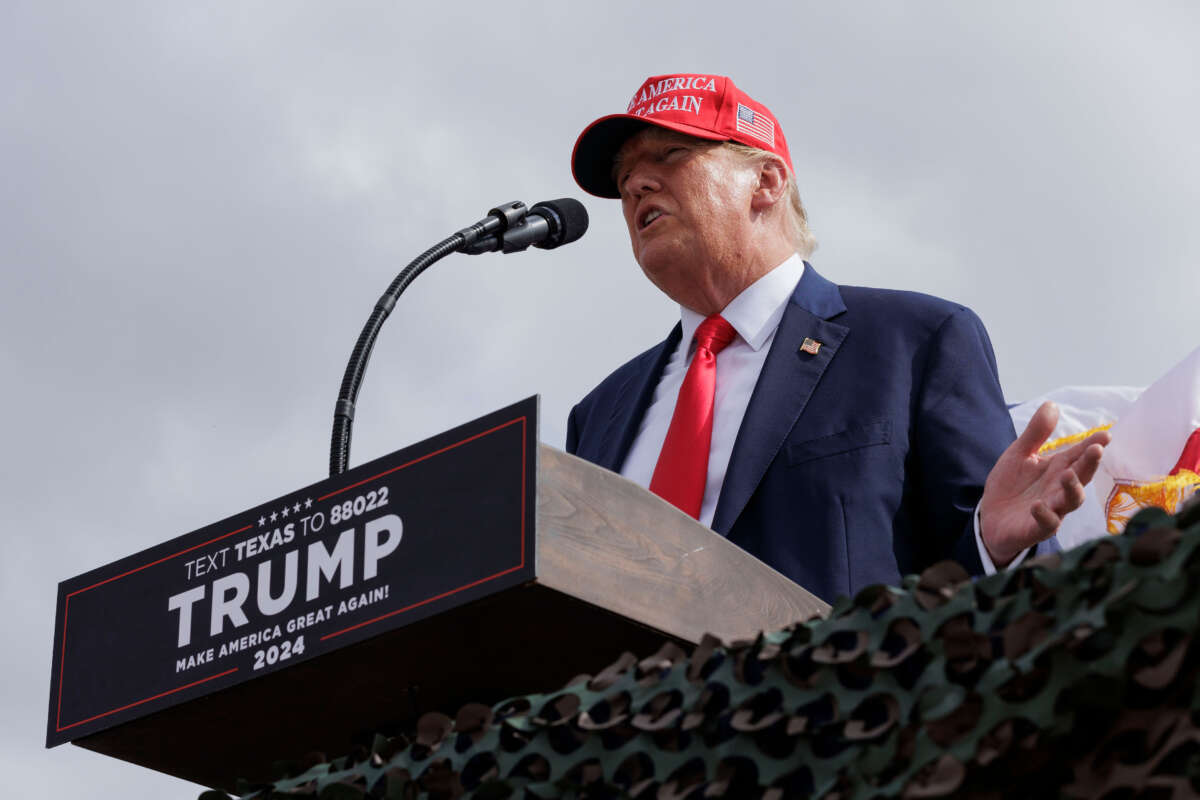Truthout is a vital news source and a living history of political struggle. If you think our work is valuable, support us with a donation of any size.
Judges on a federal panel in the District Court of Appeals in Washington, D.C. suggested on Monday that they would uphold aspects of a previously imposed gag order placed on former President Donald Trump in the trial involving his attempts to overturn the 2020 presidential election.
The original gag order, issued by district Judge Tanya Chutkan, who is overseeing the case, was made in early October, in response to several social media posts and statements made by Trump. Trump’s lawyers appealed the order, resulting in a temporary ban on its enforcement until a higher court could rule on the order.
On Monday, the appellate court panel heard arguments from Trump lawyers, who want the order completely eliminated, and from prosecutors representing special counsel Jack Smith’s office, who want it to be reimposed. The judges appeared to strongly disagree with many of Trump’s lawyers’ assertions, namely that the former president was allowed to utilize his free speech rights without any restrictions of any kind.
It’s not unusual for judges to place gag orders on defendants in criminal cases such as these, in order to ensure that the integrity of the proceedings isn’t compromised. While Chutkan’s order may be curtailed somewhat by the appellate court judges, ultimately a gag order of some kind is likely to be reimposed, political observers suggested, based on the questions that were directed toward Trump’s lawyers.
The original gag order limited Trump’s ability to make vehement statements, either in speeches or on social media, against prosecutors, court officials and court employees, as well as witnesses – those already named and those considered potential witnesses in the case. The appellate judges noted that Trump had a propensity to make social media posts that resulted in his followers intimidating the people he picked on, including in the 2020 election cycle.
“Why does the district court have to wait and see, and wait for the threats to come, rather than taking a reasonable action in advance?” Judge Brad Garcia asked Trump’s lawyers, who struggled to formulate an answer beyond saying that Trump had absolute speech rights that should not be violated simply because he is a candidate for the presidency in 2024.
Judge Patricia Millett also took issue with the lawyers’ arguments against the gag order’s specific statement regarding Trump’s potential statements creating a “clear and present danger” against witnesses and others involved in the case against him. The lawyers argued that the order was being misused as there wasn’t any danger that could be shown, but Millett noted the terminology had different meaning in judicial circles than in the literal sense.
“Clear and present danger isn’t mean[t] to be a mechanical process, it’s a balancing test” regarding Trump’s rights and the risk of his conduct detrimentally influencing the case, she said.
Political observers examined these statements from the judges and others, with many agreeing that their words suggested that the gag order was going to be reimposed.
“My highly subjective read is that the panel will narrow the order further, and tweak its language, but approve it in some form,” Roger Parloff, senior editor at Lawfare, said on X, the site formerly known as Twitter.
In a Substack post she published on Monday, former U.S. attorney Joyce Vance commented on the proceedings, noting that Trump’s lawyers insisted “that as a candidate, he has an absolute First Amendment right that means he can say whatever he wants to, wherever he wants to, free of consequence.”
“That’s simply not the case,” Vance said in response to those assertions. “There are relative rights and concerns that need to be balanced here.”
“Like many cases where different equities need to be balanced,” Vance added, “the decision comes down to a line-drawing exercise — where should the court draw the line that demarcates Trump’s right to engage in political speech from the need to protect the integrity of the trial and the safety of people involved?”
Vance continued her assessment by stating:
Reading tea leaves in oral argument is an inexact science at best, but here it seems likely that the gag order will survive in some form, even if the appellate panel directs Judge Chutkan to restrict it.
“If I was going to guess … I’d expect a prompt order that underlines Trump’s right to engage in political speech, while prohibiting conduct that exposes witnesses and other public figures to risk from Trump’s most volatile adherents or that risks impairing the integrity of his trial,” Vance said.
A terrifying moment. We appeal for your support.
In the last weeks, we have witnessed an authoritarian assault on communities in Minnesota and across the nation.
The need for truthful, grassroots reporting is urgent at this cataclysmic historical moment. Yet, Trump-aligned billionaires and other allies have taken over many legacy media outlets — the culmination of a decades-long campaign to place control of the narrative into the hands of the political right.
We refuse to let Trump’s blatant propaganda machine go unchecked. Untethered to corporate ownership or advertisers, Truthout remains fearless in our reporting and our determination to use journalism as a tool for justice.
But we need your help just to fund our basic expenses. Over 80 percent of Truthout’s funding comes from small individual donations from our community of readers, and over a third of our total budget is supported by recurring monthly donors.
Truthout has launched a fundraiser to add 379 new monthly donors in the next 6 days. Whether you can make a small monthly donation or a larger one-time gift, Truthout only works with your support.
